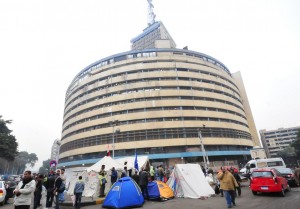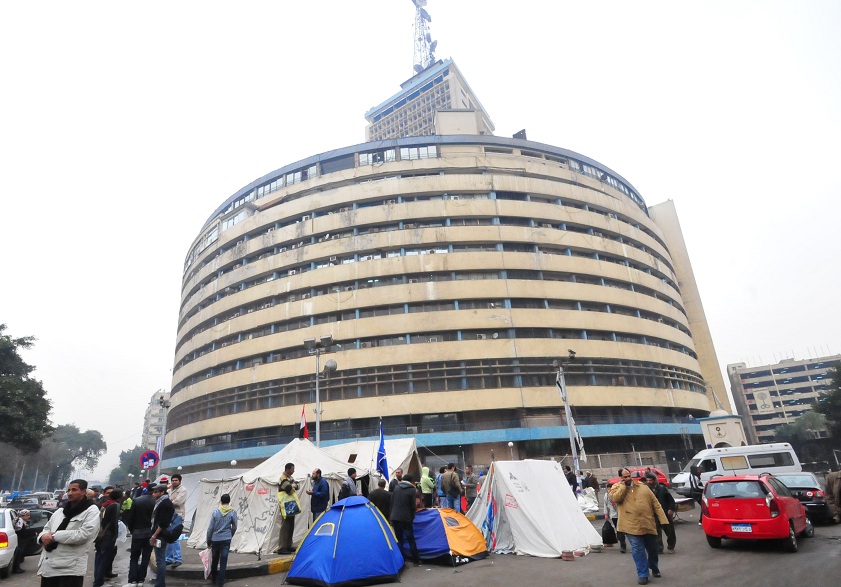
(DNE File Photo)
By Ola Noureldin
A damning report has outlined 10 months of “crisis” in Egyptian state broadcasting since the appointment of Minister of Information Salah Abdel Maqsoud. The Association for Freedom of Thought and Expression (AFTE) released the report on Monday.
According to the report, the Ministry of Information has witnessed successive crises under Abdel-Maqsoud, but failed to solve and contain most of the problems from which the state broadcasting organisation is suffering.
The report suggests the minister was unable to develop a vision or an administrative media plan to meet the aims of many Maspero workers who are fighting the imposition of media control and seeking the free flow of information.
The report said the primary problems involved editorial policies and monitoring, various violations of freedom of opinion and expression within the organisation, issuance laws and budget and financial regulations.
The report asserts that state exercised oversight over TV programme content and the imposition of certain editorial policies on the hosts. The AFTE documented several cases where Abdel Maqsoud and other government officials attempted to control content.
The AFTE claimed that current policies are similar to those under the former regime and are lacking basic standards of transparency. This was evidenced by an article in Al Masry El Youm which referred to an order from Abdel Maqsoud to host Islamist representatives on television talk shows, preferably from the Freedom and Justice Party (FJP), noting that if Islamists were not hosted, the whole section must be removed from the show.
The report criticised the minister for various violations of freedom of expression and opinion in the past ten months. In one instance, a live broadcast was cut due to a guest from the state security apparatus implying that most of the sheikhs appearing on satellite TV channels were frequent guests in his state security office.
The AFTE claimed these current policies favour the ruling party and regime.
The AFTE also claimed former head of the state-run TV sector Essam El-Amir resigned last December because of intervention in the coverage of the presidential palace clashes. This was followed by the resignation of Omar Abdelrahman, former head of the specialised channel sector, also due to unbalanced coverage on state TV.
The ATFE also catalogued financial problems within Maspero and alleged corruption in the issuing of salaries and bonuses. According to the report Abdel Maqsoud adjusted salaries without consultation, on the pretext of reducing Maspero’s debt which according to the minister now EGP 19bn banks and EGP 850m to production companies and news agencies, according to Abdel Maqsoud. However workers objected to being asked to shoulder the organisation’s financial burdens, the report noted.
The report also crticised Abdel Maqsoud’s decision to tie the flow of advertisement to each individual channel to the workers 10% bonus, as some channels have limited advertising capacity.
According to the report, Maspero’s budget and its new financial regulation have aggravated reactions within the Shura Council that were similar to the reactions of the workers at Maspero. Emad ElMahdy, chairperson of the culture and media committee of the Shura Council, claimed that what is happening at the Ministry of Information as well as Maspero is against workers’ rights and is “confirmed corruption”. He also added that the decision to apply the advertisement bonus harms the employees and may force them to leave Maspero, due to injustice inflicted upon their salaries and wages.
The report concluded that nothing has changed in Egyptian media since the 25 January Revolution and that Abdel Maqsoud is pursuing an even firmer grip over state-run media.
Established in 2006, the ATFE is headed by human rights lawyer Emad Mubarak and advocates for freedom of speech and expression.


